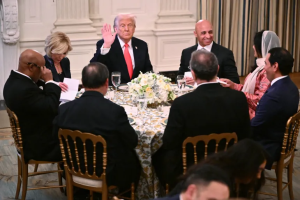
U.S. authorities have detained a Turkish university student in what appears to be the latest move against foreign learners involved in pro-Palestinian activism on American campuses.
Rumeysa Ozturk, a doctoral candidate at Tufts University, was taken into custody by federal agents late Tuesday in Somerville, Massachusetts, according to a statement from the university’s president.
Ozturk, who had previously co-authored an article in The Tufts Daily criticizing the university’s handling of student protests over Israel’s war in Gaza, has filed a legal motion demanding justification for her detention. A judge has since barred immigration officials from removing her from Massachusetts, court documents revealed.
A protest against her detention was scheduled for 9:30 p.m. GMT Wednesday in Somerville, according to local media reports.
The detention comes as former President Donald Trump intensifies efforts to curb pro-Palestinian activism at U.S. universities. His administration has targeted prestigious institutions where student protests over the Gaza conflict have been widespread, cutting federal funds and directing immigration officers to deport foreign student demonstrators.
Critics argue that the crackdown is politically motivated and suppresses free speech, while supporters claim it is necessary to maintain order on campuses and protect Jewish students.
At Columbia University, immigration officers recently detained one student, permanent resident Mahmoud Khalil, whose lawyers are now fighting his deportation. Another student, Yunseo Chung, avoided detention after a judge intervened.
Meanwhile, a group of university professors filed a lawsuit in Massachusetts on Tuesday, challenging the administration’s actions against foreign academics. The lawsuit claims the policy prevents U.S. citizens from engaging with their non-citizen students and colleagues, violating constitutional rights.
Additionally, the American Association of University Professors and the American Federation of Teachers have asked a New York court to reverse Trump’s decision to cut $400 million in federal funding from Columbia University, arguing the move is unconstitutional.
Columbia has since introduced a set of concessions, including stricter oversight of protests and academic departments, in an attempt to comply with federal demands. However, the administration has not met all of the Trump administration’s conditions.
The developments signal an escalating conflict between the White House and academic institutions, with growing concerns over the impact on international students and academic freedom in the U.S.








